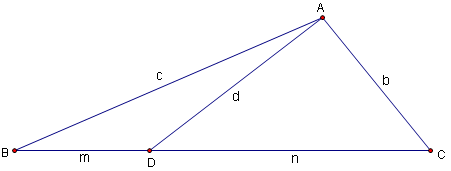Difference between revisions of "Stewart's theorem"
(→Proof 3 (Barycentrics)) |
Marianasinta (talk | contribs) |
||
| Line 79: | Line 79: | ||
[[Category:Theorems]] | [[Category:Theorems]] | ||
| + | [https://artofproblemsolving.com/wiki/index.php/TOTO_SLOT_:_SITUS_TOTO_SLOT_MAXWIN_TERBAIK_DAN_TERPERCAYA TOTO SLOT] | ||
Revision as of 16:01, 19 February 2024
Contents
Statement
Given a triangle ![]() with sides of length
with sides of length ![]() and opposite vertices
and opposite vertices ![]() ,
, ![]() ,
, ![]() , respectively. If cevian
, respectively. If cevian ![]() is drawn so that
is drawn so that ![]() ,
, ![]() and
and ![]() , we have that
, we have that ![]() . (This is also often written
. (This is also often written ![]() , a phrase which invites mnemonic memorization, i.e. "A man and his dad put a bomb in the sink.") That is Stewart's Theorem. I know, it's easy to memorize.
, a phrase which invites mnemonic memorization, i.e. "A man and his dad put a bomb in the sink.") That is Stewart's Theorem. I know, it's easy to memorize.

Proof 1
Applying the Law of Cosines in triangle ![]() at angle
at angle ![]() and in triangle
and in triangle ![]() at angle
at angle ![]() , we get the equations
, we get the equations
Because angles ![]() and
and ![]() are supplementary,
are supplementary, ![]() . We can therefore solve both equations for the cosine term. Using the trigonometric identity
. We can therefore solve both equations for the cosine term. Using the trigonometric identity ![]() gives us
gives us
Setting the two left-hand sides equal and clearing denominators, we arrive at the equation: ![]() .
However,
.
However,
![]() so
so
![]() and
and
![]() This simplifies our equation to yield
This simplifies our equation to yield ![]() or Stewart's theorem.
or Stewart's theorem.
Good Job! You mastered Stewart's Theorem.
Proof 2 (Pythagorean Theorem)
Let the altitude from ![]() to
to ![]() meet
meet ![]() at
at ![]() . Let
. Let ![]() ,
, ![]() , and
, and ![]() . So, applying Pythagorean Theorem on
. So, applying Pythagorean Theorem on ![]() yields
yields
![]()
Since ![]() ,
, ![]()
Applying Pythagorean on ![]() yields
yields
![]()
Substituting ![]() ,
, ![]() , and
, and ![]() in
in ![]() and
and ![]() gives
gives
![]()
![]()
Notice that
![]()
![]() are equal to each other. Thus,
are equal to each other. Thus, ![]() Rearranging the equation gives Stewart's Theorem:
Rearranging the equation gives Stewart's Theorem:
![]()
~sml1809
Proof 3 (Barycentrics)
Let the following points have the following coordinates:
![]()
![]()
![]()
![]()
Our displacement vector ![]() has coordinates
has coordinates ![]() . Plugging this into the barycentric distance formula, we obtain
. Plugging this into the barycentric distance formula, we obtain ![]() Multiplying by
Multiplying by ![]() , we get
, we get ![]() . Substituting
. Substituting ![]() with
with ![]() , we find Stewart's Theorem:
, we find Stewart's Theorem: ![]()
~kn07
Nearly Identical Video Proof with an Example by TheBeautyofMath
~IceMatrix









